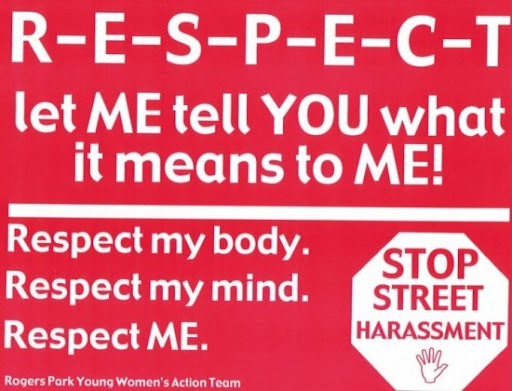 The Rogers Park Young Women’s Action Team in Chicago stands out to me as being a great organization for inspiring a positive future for girls in their community. Through the organization, girls were able to come together and collectively address issues impacting their daily life, including street harassment. They learned their power as a group and they learned the effectiveness of surveys, lobbying, rallying, and speaking out to create concrete changes. These are tools they can use their whole life to advocate for positive change and to stand up for their rights and the rights of others.
The Rogers Park Young Women’s Action Team in Chicago stands out to me as being a great organization for inspiring a positive future for girls in their community. Through the organization, girls were able to come together and collectively address issues impacting their daily life, including street harassment. They learned their power as a group and they learned the effectiveness of surveys, lobbying, rallying, and speaking out to create concrete changes. These are tools they can use their whole life to advocate for positive change and to stand up for their rights and the rights of others.
Here’s a synopsis of what they did to address street harassment in Chicago – their work continues to be very inspirational to me and I consider them role models.
From 2003 until 2011, members of the Rogers Park Young Women’s Action Team (YWAT) led an anti-street harassment campaign in Chicago, Illinois. To start, the eight founding YWAT members surveyed 168 neighborhood girls, ages 13 to 19, about street harassment and interviewed 34 more in focus groups. They published their findings in a report titled “Hey Cutie, Can I Get Your Digits?” The results were astounding: 86 percent had been catcalled on the street and 60 percent said they felt unsafe walking in their neighborhoods.
 With their report in hand, the young women began a successful and well-organized anti-street harassment campaign. For example, they worked with local business owners to let them know men standing outside their stores harassed them and made them feel unsafe. Over 120 business owners agreed to post signs in their windows that said, “R-E-S-P-E-C-T let me tell YOU what it means to ME! Respect my body. Respect my mind. Respect ME. STOP STREET HARASSMENT.” The efforts of YWAT led to fewer men loitering outside businesses, harassing girls and women.
With their report in hand, the young women began a successful and well-organized anti-street harassment campaign. For example, they worked with local business owners to let them know men standing outside their stores harassed them and made them feel unsafe. Over 120 business owners agreed to post signs in their windows that said, “R-E-S-P-E-C-T let me tell YOU what it means to ME! Respect my body. Respect my mind. Respect ME. STOP STREET HARASSMENT.” The efforts of YWAT led to fewer men loitering outside businesses, harassing girls and women.
YWAT also held public forums on street harassment and worked with local leaders, including police and elected officials, to address public safety. One of the YWAT’s major victories was the installation of more street lights along Howard Street and Morse Avenue. City officials also installed a camera on Morse Avenue to better monitor street activities.
In May 2006 and May 2007, YWAT organized a Citywide Day of Action against Street Harassment Campaign to convey the message “the streets belong to ALL OF US.” People participated in 140 forms of activism that day. (This in part inspired me to launch International Anti-Street Harassment Week.)
Action against Street Harassment Campaign to convey the message “the streets belong to ALL OF US.” People participated in 140 forms of activism that day. (This in part inspired me to launch International Anti-Street Harassment Week.)
The young women also hold anti-street harassment workshops at high schools, conferences, and community events. Their latest initiative is working to make public transportation safer in Chicago.
During the spring of 2009, the group of teenage and college-age women surveyed 639 Chicago Transit Authority (CTA) riders, mostly young women. They found that sexual harassment is common on CTA buses and trains. Over half of the survey respondents said they had been sexually harassed and 13 percent said they had been sexually assaulted. Forty-four percent of those surveyed said they had witnessed harassment or assault.
Armed with their survey results, YWAT met with the CTA Board and other key decision makers and asked that CTA employees receive training on how to deal with harassment and that CTA post more information about how people can report harassers. In a major victory for YWAT, only one month later in July 2009, the CTA announced it would expand its policies on how bus and rail operators deal with harassers. The CTA said it would update its public safety tips brochures to include information about harassment and how to report it.
In November 2009, the CTA began to made good on their word and launched PSAs about harassment. Their new print PSA states, “If it’s unwanted, it’s harassment. Touching. Rude comments. Leering. Speak up. If you see something, say something.” At the bottom of the poster there is information for whom to contact if a rider is the target of sexual harassment.
Their work inspired me and others in Washington, DC, to testify before our city council and metro leaders last month to advocate for a PSA campaign too.
Teenage girls face the most frequent street harassment of any age group and I believe it is so important for them to have a big voice in speaking out about this issue and demanding changes that are realistic and will impact the specific problems they face.
